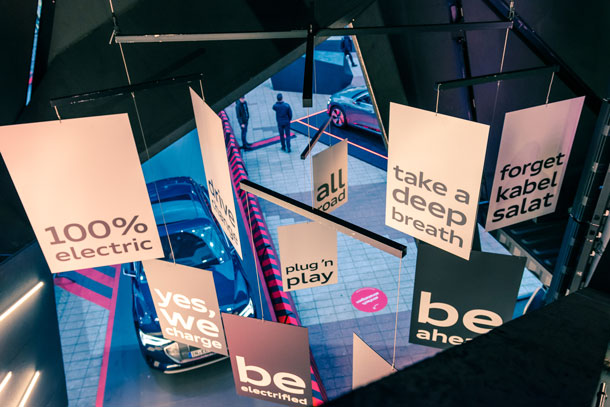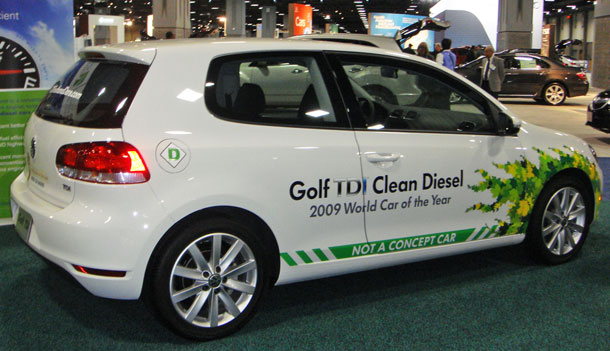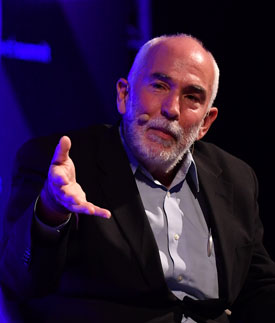Volkswagen Goes All-Electric
Air Date: Week of March 1, 2019

Audi, one of the car manufacturers under the Volkswagen group, has announced their e-tron, an electric-powered SUV. (Photo: Jakob Härter, Flickr, CC BY-SA 2.0)
After its 2015 diesel emissions scandal, Volkswagen has announced an all-electric car factory in the United States, with manufacturing to begin in 2022. This is all part of the German car manufacturer’s plan to stop making gas and diesel-powered cars by 2026. Jim Motavalli, freelance writer and blogger for NPR's Car Talk, joins host Steve Curwood to talk about the future of electric cars and the new Volkswagen--“people’s car”.
Transcript
CURWOOD: It’s Living on Earth, I’m Steve Curwood.
As Congress considers a resolution to make a Green New Deal for the US economy, a German car maker has already positioned itself to show how the transition to climate-friendly technology can make economic sense and create jobs in the US and elsewhere. Volkswagen is the world’s second biggest carmaker and it has announced it will stop making gasoline and diesel powered cars by 2026 and go all-electric. It is also planning to build an all-electric vehicle factory in the United States, with cars rolling off that production line as soon as 2022. VW’s pivot to electric cars comes on the heels of a 2015 scandal that the company misled the public about the efficiency of their diesel vehicles. Here to talk about Volkswagen’s plans is CarTalk blogger and green transportation reporter, Jim Motavalli. Welcome back to Living on Earth, Jim.
MOTAVALLI: Great to be on.
CURWOOD: So I saw the other day that Volkswagen says that it's going to stop making fossil fuel powered cars by 2026. How feasible is this?
MOTAVALLI: I think it's very feasible. It's where the industry is going. It's not just Volkswagen. It's all automakers moving in this direction, maybe not quite as quickly. But there's a reason that Volkswagen is making this stark departure and is leaving behind internal combustion. It has everything to do with their diesel scandal and the diesel settlement, which is, in the US, a $10 billion dollar settlement. And what's happening is Volkswagen used to be very much partisan for diesel technology, and they would say we can build diesel cars that are so clean we will never need to go electric. And it certainly appeared that that is what they had done. They released these very clean diesels. Lot of people bought them. 500,000 people, something like that.
CURWOOD: Except there was a little problem, right? There was a thumb on the scale.
MOTAVALLI: An electronic thumb on the scale. Yes, the cars only were within emission limits when they were being tested. On the road, they were something like 40 times over the emission limit. The chutzpah of that just amazed me when it happened. And there have been repercussions ever since, including, I would say, Volkswagen, which is the biggest partisan of diesel, had the biggest role in killing diesel as a technology not only in the US, but globally. I mean, I think all automakers have pivoted to electric, because diesel really can't achieve what they were talking about. It's the dirtiest fossil fuel and they were nowhere close to their emission goals there.

In 2015, the US Environmental Protection Agency found that Volkswagen had programmed their diesel engines to activate emissions controls only during testing, and not during real-world driving. Volkswagen eventually pleaded guilty and agreed to pay $4.3 billion in penalties. (Photo: Mario Roberto Duran Ortiz, Wikimedia Commons, CC BY-SA 3.0)
CURWOOD: And remind us just how big a deal is the company Volkswagen?
MOTAVALLI: Well, it's one of the biggest automakers internationally. It's the Volkswagen Group, it also includes Audi and Porsche and, believe it or not, Bugatti. So it's a big conglomerate, it’s the second largest in the world in terms of just number of cars produced.
CURWOOD: And now as I understand it, Volkswagen is going to start building electric cars.
MOTAVALLI: Yeah, the e-tron is an Audi electric car. It is going to be on the market in a few months, you can take reservations for it now. And following that, we’ll get the Porsche Taycan and these cars will be serious competition for Tesla. If you look at it, Tesla had a number of years, maybe five or six years with pretty much no competition in the fields they’re in. Nobody was producing electric cars with the kind of range, with the kind of price they were offering, and certainly with the performance they have. And it was only a matter of time before the big OEM automakers caught up and started offering similar products. That's happening now, and it's one of the challenges Tesla is facing. Right now, there's still nothing on the market that's comparable to the Tesla Model 3, or the Model S, or the Model X, but those are all coming.
CURWOOD: I understand that they're going to open a car factory for these electric cars. Where and how many jobs would it create?
MOTAVALLI: I think it's something like 1,000 jobs. It's going to be in Chattanooga, where they have their car plant now. It's a very high volume plant, and they're going to be turning these out by 2020. I believe the cars were delayed by a few months, but next year, they're definitely going to be producing a small hatchback there. But there's a number of models that are in the pipeline, including a crossover SUV and version of the Microbus.
CURWOOD: Jim, the cars that Volkswagen Group is putting forward initially, I imagine they're going to go for a very fancy price tag. But my German is wobbly, but I believe Volkswagen means, essentially, the people's car. So what are they going to make that many people can afford to purchase?
MOTAVALLI: Well, the first car that Volkswagen itself is producing is a small hatchback, and they said they're going to produce them at half the price of Tesla. I think that's probably a little exaggerated, it's probably going to be more like maybe two-thirds the price of a Tesla, but they're going to be cheaper than the Tesla and the Volkswagen has said that it's going to be all electric. It's going to produce something like 27 models on one platform. This is a serious, big commitment to electric, which would have never happened if they hadn't been caught with their diesel pants down.
CURWOOD: And how much money is the Volkswagen Group investing in electric cars for this conversion, do you know?
MOTAVALLI: I've heard it’s several billion dollars. Actually, 30 billion in electric mobility as a whole, so it's a big push. It's the commitment by the automaker; they are all in on electric cars. And it's not just demand in the US, there's a number of countries in Europe that are talking about going all-electric, of not even allowing the sale of internal combustion cars. France is an example of this. And already in Europe, a lot of inner cities are reserved for electric mobility only. So, the handwriting is on the wall in Europe. I think the whole world's going this way.
CURWOOD: Jim, before you go, tell me how do you imagine the future of motor vehicles will look like?
MOTAVALLI: I think the future of vehicles is electric, connected, autonomous, and we're going to be getting around in, sort of, cars that are not so much personally owned as shared. The acronym for this is ACES. So it's Autonomous, Connected, Electric, and Shared. And that's where we're headed. All vehicles will be like that. Nobody doubts this, every automaker in the world thinks we're headed this way. So I think ACES is pretty much where we're going.

Jim Motavalli is a freelance environmental journalist and blogger for NPR’s Car Talk (Photo: Seb Daly, Web Summit, Wikimedia Commons, CC BY 2.0)
CURWOOD: So, if it's going to be ACES for the electric car, to twist the analogy, the snake eyes is coming up for the internal combustion engine?
MOTAVALLI: I think so. It’s… the timeline of it is very hard to predict. I don't think it's going to happen tomorrow. It may not even happen in this decade. It may be till 2030 or after that. To talk about when we get to the point where people can sit in the back of the car and it can deliver you somewhere…everybody expects that autonomy will look like that. That point is not that close. We have a lot to work out before that happens both in technology, regulation, insurance, all those things, but we're going to end up there.
CURWOOD: And before then?
MOTAVALLI: Before then, we'll have a mix of electric and conventional internal combustion cars on the road, and we'll have more and more autonomy in the cars. Right now a number of automakers will let you have the car be pretty much autopiloted on the highway. I would say another thing that we're seeing is, say, 5G connectivity in the car. So, instead of bringing your car in for an update, it's going to be done over the air. And Tesla pioneered that, but the entire industry has adopted it, so that's another part of what we're seeing. But a mix of cars for the next 10 years on the road. We're not going to be all ACES cars for quite a while.
CURWOOD: Jim Motavalli blogs for NPR’s Car Talk and he's a freelance environmental journalist. Jim thanks for taking the time again today.
MOTAVALLI: It was great to be on.
Links
Fortune | “Volkswagen's Pivot to Electric Vehicles Will Bring 1,000 Jobs to Tennessee”
Living on Earth wants to hear from you!
Living on Earth
62 Calef Highway, Suite 212
Lee, NH 03861
Telephone: 617-287-4121
E-mail: comments@loe.org
Newsletter [Click here]
Donate to Living on Earth!
Living on Earth is an independent media program and relies entirely on contributions from listeners and institutions supporting public service. Please donate now to preserve an independent environmental voice.
NewsletterLiving on Earth offers a weekly delivery of the show's rundown to your mailbox. Sign up for our newsletter today!
 Sailors For The Sea: Be the change you want to sea.
Sailors For The Sea: Be the change you want to sea.
 The Grantham Foundation for the Protection of the Environment: Committed to protecting and improving the health of the global environment.
The Grantham Foundation for the Protection of the Environment: Committed to protecting and improving the health of the global environment.
 Contribute to Living on Earth and receive, as our gift to you, an archival print of one of Mark Seth Lender's extraordinary wildlife photographs. Follow the link to see Mark's current collection of photographs.
Contribute to Living on Earth and receive, as our gift to you, an archival print of one of Mark Seth Lender's extraordinary wildlife photographs. Follow the link to see Mark's current collection of photographs.
 Buy a signed copy of Mark Seth Lender's book Smeagull the Seagull & support Living on Earth
Buy a signed copy of Mark Seth Lender's book Smeagull the Seagull & support Living on Earth

